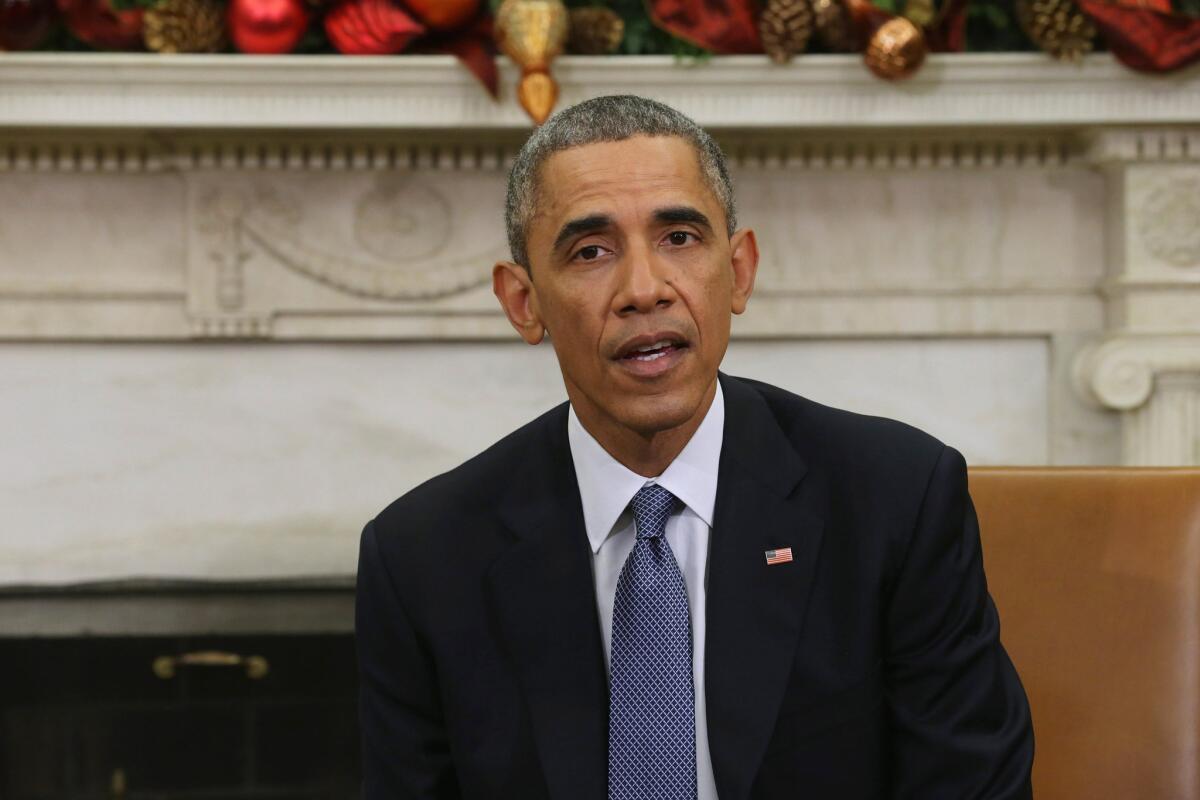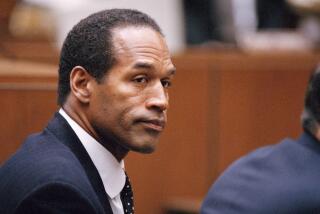Obama calls for persistence in confronting ‘deeply rooted’ racism

- Share via
Reporting from Washington — President Obama, responding to the wave of protests and racial tensions across the country in recent weeks, appealed for patience and persistence in solving what he described as an issue “that is deeply rooted in our society ... our history.”
“When you’re dealing with something as deeply rooted as racism or bias in any society, you got to have vigilance, but you have to recognize that it’s going to take some time,” Obama said in an interview to be aired Monday evening on BET Networks. “You just have to be steady so you don’t give up when we don’t get all the way there,” he said in a short video clip of the interview released Sunday.
Obama has come under increasing pressure to speak out after a grand jury declined last week to indict New York police Officer Daniel Pantaleo in the death of Eric Garner, an unarmed black man who was being arrested on suspicion of illegally selling loose cigarettes. The Staten Island grand jury’s decision came little more than a week after a St. Louis County grand jury failed to indict Ferguson, Mo., police Officer Darren Wilson for fatally shooting Michael Brown, an unarmed black 18-year-old whose death prompted unrest.
------------
FOR THE RECORD
5:36 p.m.: An earlier version of this post misspelled Daniel Pantaleo’s name as Pantoleo.
------------
Responding to these cases has proved challenging for Obama. As the first African American president, he has in the past addressed America’s racial tensions in a personal way, saying after the 2012 shooting death of black teenager Trayvon Martin that the victim would have looked like Obama’s son, if he had one — or even Obama himself 35 years ago.
Amid the protests in Ferguson, Obama has expressed empathy for those angered by what they perceive as unfair policing practices. The administration also has provided funding for police departments to equip their officers with body cameras to record their activities.
At the same time, the president has condemned looting and violence that stemmed from the protests. Obama has refrained from visiting Ferguson and has generally sought to frame the problem as part of a national debate on law enforcement and its tactics and relations with minority communities.
The debate took on added intensity Sunday as Garner’s widow, Esaw Garner, said on national television that her husband was “murdered unjustly.”
Speaking on NBC’s “Meet the Press,” Garner said she and her husband faced repeated harassment from police before that July day when he died on a street in Staten Island, moments after Pantaleo put him in an apparent chokehold, a scene captured on video.
“The police knew him by name,” Garner said of her husband, a large man who had asthma. “They harassed us, they said things to us. … I would just say, ‘Eric, just keep walking, don’t respond. Don’t give them a reason to do anything to you.’”
She added that she feared for the safety of her two sons. “I’m so afraid of what could happen to them in the street by the police.”
Garner’s death is being investigated by the New York Police Department and separately by federal authorities for possible civil rights violations. New York Police Commissioner Bill Bratton said Sunday that the investigation will take three to four months.
Obama isn’t the only politician grappling with his response to Garner’s death. New York Mayor Bill de Blasio wouldn’t say whether he thought Garner’s civil rights had been violated, but noted that the relationship between police and minority communities reflects “not just decades of problems, [but] a history of centuries of racism that undergirds this reality.”
De Blasio, appearing on ABC’s “This Week,” expressed worries that his own biracial son could be unfairly treated by police, saying he had done what other parents with children of color have done for years.
“It’s different for a white child. That’s just the reality in this country,” De Blasio said. “And with Dante, very early on with my son, we said, ‘Look, if a police officer stops you, do everything he tells you to do — don’t move suddenly, don’t reach for your cellphone.’ Because we knew, sadly, there’s a greater chance it might be misinterpreted if it was a young man of color.”
That gap was reflected in a NBC poll released Sunday. The survey found that 39% of whites agreed that law enforcement applied different standards for whites and blacks. Among blacks, however, 82% said the standards were different. A slim majority of whites said they had confidence that law enforcement would treat races equally, but only 12% of blacks shared that sentiment.
In the interview clip with BET, Obama acknowledged the lingering grip of racism in America, but also urged against despair over the recent events.
“It’s important to recognize, as painful as these incidents are, we can’t equate what’s happening now with what was happening 50 years ago,” he said. “Things are better. Not good in some cases, but better. And the reason it’s important for us to understand progress has been made is that that then gives us hope we can make even more progress.”
More to Read
Sign up for Essential California
The most important California stories and recommendations in your inbox every morning.
You may occasionally receive promotional content from the Los Angeles Times.














